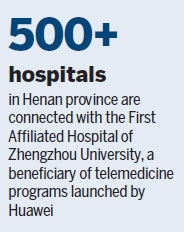Advanced medical services given boost
Chinese information technology giant Huawei is taking grand steps in the field of medicine by developing advanced systems for hospitals to use with their patients in order to provide better healthcare.
The company has built a regional medical information platform using big data and cloud computing technologies.
Its healthcare solutions enable medical professionals, organizations and infrastructure to collaborate and securely share healthcare data more effectively.
Huawei says it has developed telemedicine applications, including remote high-definition video, teleconsultation, remote surgery demonstration, medical video-on-demand and remote doctor visits. So far, it has cooperated with regional hospitals to launch telemedicine programs and made good progress, according to the company.
The First Affiliated Hospital of Zhengzhou University in Henan province is one of Huawei's partners.
A joint innovation center of telemedicine and big data in the hospital, connected with more than 500 other hospitals in the province, is helping to create a nationwide platform.
The center can provide many medical services, such as remote consultation, emergency medical advice, intensive care, electrocardiograms and imaging diagnoses.
In the past, the average time it took for an emergency patient from Xinyang, Henan province to see a doctor at the First Affiliated Hospital of Zhengzhou University was more than 10 hours.
The telemedicine system cuts that time down to less than an hour.

With the help of Huawei, the hospital has built a network for telemedicine, which covers villages, counties and cities in the province, and will not only improve the efficiency of consultation, but also provide medical education to basic-level hospitals and clients.
Huawei has also provided medical solutions to the First People's Hospital of Yulin in the Guangxi Zhuang autonomous region.
To improve the insufficient medical capacity of health institutions and clients in counties and villages in the city of Yulin, higher requirements were needed for the telemedicine system.
The company used its advanced proprietary technology to ensure that video calls could be made in 1080p resolution at 60 frames per second to improve consultation experience.
The optimization of the telemedicine system helps the hospital to offer services to patients in the Yulin region, especially those in rural areas.
In the future, Huawei plans to develop futuristic oral nano-size intelligent surgical robots to assist in molecular-level surgery on abnormal cells, and an artificial intelligent doctor system that can act as a family health manager, which can diagnose and treat common diseases and help to manage chronic diseases.
caoyingying@chinadaily.com.cn
(China Daily 11/12/2018 page15)














